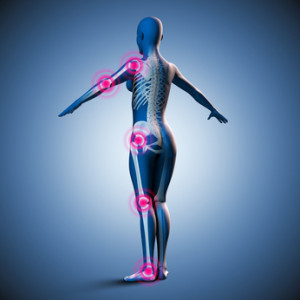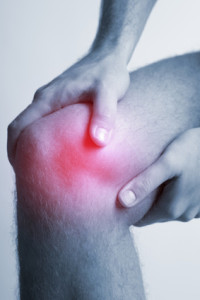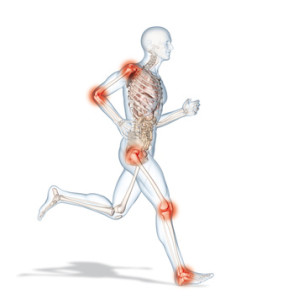Arthritis is the common term used to describe over a hundred medical conditions that impact the musculoskeletal system, in particular, the joints. The most common form of this degenerative joint disease is known as osteoarthritis.
In the UK alone, it is thought that 10 million people, or 1 in 5 of the adult population are suffering from arthritis1. In most cases, it’s not one joint but several that are affected by this disease. Arthritis is most commonly associated with hip and knee joints, as well as wrists and fingers. It can affect people of all ages, although the elderly tend to be more susceptible.
Numerous therapies and costly operations are often the result of arthritis. However, many people have reported that a change to diet can reduce the severity of this disease, and in some cases, eradicate the symptoms completely.
Contents
What Arthritis Does to Our Joints
Arthritis causes the cartilage of a joint to become progressively thinner. Cartilage is the elastic layer between two bones in the joint. This cartilage ensures that movements are smooth and it also protects the bones against sudden impacts. If the cartilage is completely removed, the bones rub against each other unprotected. This causes stiffness, pain, inflammation and swelling. Consequently, the affected joints have restricted mobility and this can be very debilitating for patients.
Symptoms of Arthritis
Arthritis can have a range of symptoms as there are many variations of this disease. However, some of the most common signs of arthritis include:
- Tenderness or pain in a joint that is triggered by activity or movement
- Joint inflammation
- Persistent joint pain
- Joint deformity
- Loss of flexibility or motion in a joint
- Extreme fatigue
- Crepitus of the joints
Early symptoms of arthritis are usually an unusual sensation of stiffness or inflammation, especially at the beginning of a movement, or after periods of rest (sleep, prolonged sitting). Often in the early stages of the disease, the associated pain with joint movement is temporary. As arthritis develops further, the pain becomes more persistent.
The Cause of Arthritis
Determining the exact cause of arthritis can be challenging as there are a number of factors involved. Genetics may play a role, but the relationship is poorly understood. As we age, cartilage becomes more brittle and can’t repair as easily. This may explain why elderly people are more susceptible to developing arthritis. Other contributing factors can include joint damage due to injury, infection or illness. Also, excess body weight can put stress on the joints and increase the risk of arthritis.
One major contributing factor to arthritis is arachidonic acid (AA). A polyunsaturated omega-6 fatty acid, AA is central to the inflammatory processes that lead to an increased degradation of collagen and cartilage. This acid triggers the production of inflammatory leucotrienes and prostaglandins to help repair and heal the body. However, in high concentrations, AA causes an overreaction of the body’s inflammatory response and when this occurs it’s very hard to stop and reverse the inflammation.
Arachidonic acid occurs naturally in our body. In addition to helping the body repair itself, it’s also involved in muscle growth and brain function. The problem is that through our diet, we can promote elevated, prolonged concentrations of this acid. Meat, eggs and dairy are rich in AA and although good for you, it’s important to eat these foods in moderation to maintain a healthy intake of this fatty acid.
Here is a video summarising the causes and effects of arthritis:
[tube]Yc-9dfem3lM[/tube]
Treating Arthritis
The most common approach to treating arthritis is to use medications to relieve the pain. This often involves non-steroidal anti-inflammatory drugs, or if the pain is not as acute, simple analgesics can be used. While these are all effective treatments, they only mask the pain and don’t remedy the underlying cause. Also, long-term use of these medications can lead to other health problems.
There is also a range of Disease Modifying Antirheumatic Drugs (DMARDs) that can be used to slow down and occasionally prevent joint destruction in patients suffering from rheumatoid arthritis2. However, the long term side effects of these drugs are largely unknown.
How Diet Can Influence & Treat Arthritis
It is possible to treat arthritis by changing our diet. This natural approach has no negative side effects and can positively influence other aspects of our health. By incorporating certain foods into our diet we can reduce inflammation and provide the body with important cartilage building nutrients. This helps to restore cartilage regeneration and prevent arthritis.
Limiting our intake of arachidonic acid rich foods is one important element. However, there are also a range of amino acids, micronutrients, vitamins and trace elements that are very important in the fight against arthritis.
Important Amino Acids & Micronutrients in the Treatment of Arthritis
There are several amino acids and micronutrients that have been recognised as having therapeutic properties associated with arthritis.
L-methionine (M): Cartilage consists of a large proportion of sulphur. Methionine is a sulphur containing amino acid that promotes the development of cartilage tissue. This essential amino acid is one of the most important and effective in the diet therapy of arthritis 3. Research has shown that after four weeks, methionine supplementation appears to show effects comparable to those of conventional anti-inflammatory drugs 4. A major advantage of taking methionine is that there are no negative side effects.
Good dietary sources of methionine include fish, meat, brazil nuts, soy and sesame seeds. Ideally, to promote the metabolism of methionine it should be taken with vitamin B12 and folic acid. Food rich in vitamin B12 and folic acid include legumes, spinach, beetroot, broccoli, asparagus, banana, oranges and peaches. Also, liver, kidney and egg yolks are the best animal sources.
L-arginine (R): Arginine supports the immune system and can promote the healing of inflammatory processes. In addition, arginine improves circulation and can thus help to transfer micronutrients to the joints.
Arginine can be boosted through eating seafood, chickpeas, soybeans, wheat germ, buckwheat, oatmeal and nuts. Dairy products and meat are also good sources of arginine.
Glucosamine (D-GlcN): This amino sugar occurs naturally in the body and is an important constituent of cartilage. There have been numerous studies into the therapeutic applications of D-GlcN in the treatment of arthritis5. It has been shown to have a positive influence in reducing the symptoms of arthritis, as well as helping to rebuild cartilage6. It can help to reduce pain, improve mobility, and decrease swelling and stiffness.
As food sources for this amino sugar are limited, supplements derived of chitin are recommended. For individuals allergic to shellfish, other alternatives are available.
Chondroitin: This sulphated polysaccharide is a precursor of D-GlcN and is often combined with D-GlcN in supplements. In the human metabolic process, there is a conversion of chondroitin to glucosamine. Chondroitin helps to promote cartilage elasticity and structure.
The best source of chondroitin is from animal cartilage, particularly bovine (cow). There are a range of chondroitin supplements available on the market today.
Methylsulfonylmethane (MSM): A sulphur-containing amino acid-like complex, MSM has a very high concentration of sulphur. As sulphur is one of the main components needed for the development of cartilage, it’s reasonable to theorise that MSM supplements may be beneficial in the treatment of arthritis. To date, pilot clinical trials suggest that there is potential for MSM to help reduce the severity of arthritis7. However, more detailed studies are necessary.
Collagen hydrolyzate: Another important element involved in the formation of healthy cartilage is collagen hydrolyzate. Clinical trials have shown that there is potential to reduce pain in patients suffering from arthritis using collagen hydrolyzate8. However, similar to MSM, further clinical trials are necessary.
Important Trace Elements & Vitamins in the Treatment of Arthritis
The most important vitamins and trace elements for the treatment of arthritis include anti-inflammatory vitamins C and E and the trace elements manganese, copper, selenium and zinc. Copper and zinc stimulate the enzyme SOD (superoxide dismutase), which can reduce the stiffness and pain associated with arthritis.
Arthritis can be a very painful and debilitating disease. While conventional pain relief treatments are beneficial, there can be undesirable side effects. Paying careful attention to your diet can help to treat the symptoms of arthritis. If caught at the early stages of development, it’s possible to slow the progression of this disease and possibly reverse the damage.
Certainly there is still a lot of work to be done studying some of the micronutrients mentioned, especially MSM and collagen hydrolyzate. However, there is also very good evidence to suggest that many of the micronutrients and amino acids discussed can be highly beneficial in the treatment of arthritis.
Eating a balanced diet with plenty of fibre, vegetables and anti-inflammatory omega-3 fatty acids is highly recommended. There are also many different arthritis supplements available that can offer a source of important micronutrients not easily accessible through our diet. Through a healthy diet, supplementation and regular exercise it can be possible to help treat and prevent arthritis naturally.
Related sources:
- “http://www.arthritiscare.org.uk/AboutArthritis/FAQs ↩
- “http://formularyjournal.modernmedicine.com/news/treatment-rheumatoid-arthritis-review-recommendations-and-emerging-therapy” ↩
- “http://arthritis-research.com/content/9/6/R127” ↩
- “http://www.ncbi.nlm.nih.gov/pubmed/3318443” ↩
- “http://www.sciencedirect.com/science/article/pii/S0889857X05701162” ↩
- “http://www.medscape.com/viewarticle/557058” ↩
- “http://www.ncbi.nlm.nih.gov/pubmed/16309928” ↩
- “http://www.ncbi.nlm.nih.gov/pubmed/11071580” ↩






